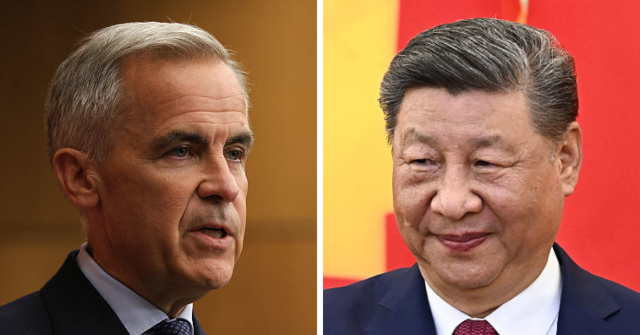The Communist Party of China imposed a 75.8-percent tariff on Canadian canola products on Thursday, claiming that Canada was intentionally “dumping” underpriced canola seed into the Chinese market to hurt domestic farmers.
The measure appeared to be a response to the Canadian government, still under radical leftist Prime Minister Justin Trudeau at the time, imposing a 100-percent tariffs on Chinese electric vehicles (EVs) last year to protect Canada’s fledgling homemade EVs. Chinese state media explicitly mentioned Canada’s “trade protectionist and restrictive measures against China” in reporting the canola seed tariffs, accusing Ottawa of violating World Trade Organization (WTO) rules. Beijing regularly manipulates the WTO to benefit its economy, most prominently by presenting itself as a “developing” country despite being the world’s second-largest economy.
China’s tariffs follow months of the Canadian government, still under Liberal Party rule following the election of current Prime Minister Mark Carney, struggling to prevent the imposition of much smaller tariffs by the United States. Carney won a special election to replace Trudeau in April by proclaiming himself the best candidate to combat President Donald Trump’s proposed tariffs, although Trump’s tariff policies against other countries had not actually impacted Canada at the time.
Trade talks with the United States have not, at press time, yielded any significant progress on lifting tariffs on Canadian goods, and Carney began admitting in July that he may not be able to convince Trump not to impose any tariffs. In early August, Trump announced a tariff of 35 percent on Canadian goods not covered by the United States-Mexico-Canada Agreement (USMCA), a continental free trade agreement.
Carney has not meaningfully commented on the China tariffs as of Thursday.
The Chinese Ministry of Commerce announced the canola tariffs on Tuesday, scheduled to be implemented on Thursday, declaring them necessary after an investigation into “dumping.” “Dumping” is the process of one country flooding the market with high volumes of an underpriced good, intended to increase the supply and lower the price to outcompete local manufacturers. China regularly engages in dumping around the world, of everything from steel to televisions to EVs.
The Ministry of Commerce accused Canada of using “extensive government subsidies and preferential policies in Canada’s agricultural sector” to dramatically increase its canola supply and sell it abroad, “which have distorted market supply and demand and led to severe overcapacity.” The Chinese government claimed this practice actively hurt Chinese canola farmers.
The investigation that resulted in the tariffs has not yet concluded, according to Beijing, and tariffs may be rescinded in December — or the investigation may be extended by six months.
“MOFCOM conducted the investigations in strict accordance with Chinese laws and regulations as well as WTO rules,” a spokesperson for the ministry said, according to the Global Times state propaganda outlet, “upholding the principles of fairness, impartiality, openness, and transparency.”
The Global Times explicitly linked the canola situation to Canadian anti-dumping measures imposing tariffs on Chinese EVs and steel. While Chinese tariffs allegedly uphold “fairness, impartiality,” and other virtues, the state outlet condemned the Canadian tariffs, imposed for the same reasons, for “disrupt[ing] the international order” and “lack[ing] justification in both reason and law.”
Representatives of the Canadian canola industry lamented that the move would “have significant impacts” on local farmers. Chris Davison, president of the Canola Council of Canada, told the Canadian Press that the massive tariff means “the Chinese market is effectively closed to the Canadian canola industry.”
Davison described the problem as a “political issue that requires a political solution,” urging Carney to act to protect farmers.
The Canadian national government has taken little action at press time. International Trade Minister Maninder Sidhu and Agriculture Minister Heath MacDonald issued a joint statement on Tuesday rejecting the accusation that the country was engaged in dumping and praising Canadian canola as a quality product.
Conservative leaders condemned Carney for failing to protect Canadian industry. Conservative Party leader Pierre Poilievre — who squandered a 26-point lead against Carney in the April election, then refused to give up leadership despite losing his own parliament seat — called the canola tariff “new and disastrous.”
“Prime Minister Carney is losing and Canada is paying the price,” Poilievre declared. “He has failed to get Beijing’s tariffs lifted; failed to support our farmers and seafood producers. And now, the tariffs are getting worse.”
Carney is also facing some pressure from the left to act more efficiently in protecting the Canadian economy. The Globe and Mail newspaper, which leans left, published an editorial on Wednesday accusing Carney of disregarding the concerns of Canada’s agricultural sector because it is based in conservative areas. The farmers are hurt, the editorial argued, by “Ottawa’s seeming determination to shield the steel, aluminum and auto sectors at any cost.”
“The protection game started with the Trudeau government offering tens of billions of dollars in construction and (contingent) production subsidies to lure EV battery makers to Ontario and Quebec,” the Globe and Mail noted. That industry, the newspaper noted, is responsible for much fewer jobs than agriculture, but “the jobs being protected are in Liberal-friendly ridings and the jobs at risk are in areas where government MPs are scarce.”
Follow Frances Martel on Facebook and Twitter.
Read the full article here


